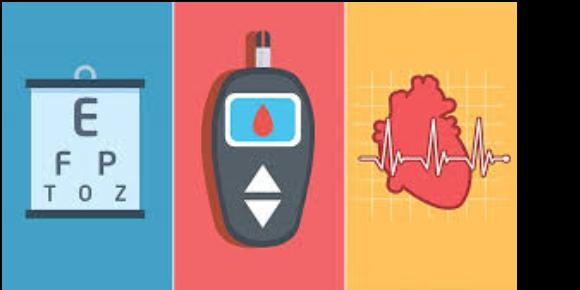
- posted: Nov. 21, 2019
What to know about Diabetic Eye Disease
The Center for Disease Control and Prevention states that diabetes is the leading cause of new cases of blindness in American adults. About 1 in 4 people with diabetes age 40 or older have diabetic eye disease, with 4% having serious cases of retinopathy. These numbers are only expected to grow in the upcoming years due to the lack in physical activity and healthy eating.
There are basically 2 general types of diabetes. Type 1 is a chronic condition in which the pancreas produces little or no insulin. About 1.25 million Americans have type 1. Although previously known as juvenile diabetes, people of any age can get type 1 diabetes. Now, experts know of a slightly different form of type 1 that is actually an autoimmune disorder and also has characteristics of type 2 as it develops later on in life. Type 2 diabetes affects 90% of Americans. This occurs when the body has problems processing or making enough insulin, a hormone that is needed for our cells to utilize sugar for energy. Risk factors for type 2 diabetes include obesity, an unhealthy diet, and physical inactivity.
Serious complications of diabetes can result if diabetes is not managed . Hypoglycemia, skin infections, nerve pain, kidney disease, dental disease, foot problems, and vision loss are some of the complications. In the eye, diabetes damages the blood vessels in the retina causing swelling of the macula and growth of abnormal blood vessels. These changes lead to macular edema, premature cataracts, glaucoma, and retinal detachments. In the U.S., 12,000-24,000 new cases of blindness occur each year in the U.S.
Those with diabetes should get a comprehensive eye exam at least once a year to ensure their eyes are healthy. Annual eye exams can detects problems when you may not initially notice any problems thereby helping to diagnose early diabetes and other disorders. Call our office to schedule an eye exam or if you have any questions.
Location
701 5th Ave #315
Seattle, WA 98104, US
Hours
Walk-ins are welcome but appts. are encouraged
9:00 am - 5:00 pm
9:00 am - 5:00 pm
9:00 am - 5:00 pm
9:00 am - 5:00 pm
9:00 am - 5:00 pm
Closed
Closed


